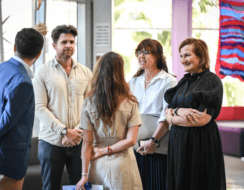26 Jun 2019
NewsFrom the CEO: A global perspective on refugee settlement
We’re living in a world where every minute 25 people are forced to flee their homes. New figures from UNHCR show that by the end of 2018, 70.8 million people globally were displaced from their homes – representing the highest level since the UN refugee agency began 70 years ago.
Finding a way to humanely and practically respond to this flow of human traffic is quickly becoming a key challenge of our times.
One of the ways we can do this is to share best practice examples with our peers in other countries, something I recently did in a presentation on refugee entrepreneurship at the Diversity in Organisations, Communities and Nations Conference in Greece.
SSI’s Ignite® Small Business Start-ups initiative has a proven, transplantable model that can benefit populations in different demographics and countries, like Canada where this initiative is currently being rolled out to refugee and migrant entrepreneurs with great success.
I was honoured to have the chance to share ideas and knowledge SSI has gained while running Ignite®. While I was in Greece, I also had the opportunity to visit a refugee camp and meet with refugees, staff, volunteers and representatives from the Greek government and the International Organisation for Migration.
The camp itself sits in an abandoned seaside resort in Myrsini in western Greece, where huts have been restored to accommodate 300 Syrian families. They have access to WiFi, informal Greek classes, local schools or onsite education, and vouchers to buy fresh produce for their meals.
Seeing the camp made me feel very proud of my Greek heritage; however, the organisers were very frank in describing this camp as a best practice example. The situation is more dire on the islands of Chios – where my own family is from – and Lesbos, where international organisations like Oxfam have condemned the inhumane conditions of refugee camps.
I was heartened, however, to see how welcoming the local community was to refugees. The biggest issue for them is that Greece is seen as an interim country on the way to Italy, Germany or France. The Greek government is increasingly encouraging people to become citizens and is working to progress integration policies and processes.
The Diversity Conference itself was themed around border crossing narratives and learning from the refugee experience and examined the concept of diversity as a positive aspect of a global world and a globalised society. It recognised that diversity is in many ways not only reflective of our present world order but also of the diversity in communities and government policy, such as racism, conflict, discrimination and inequity.
SSI is also an active participant in international forums hosted by UNHCR, where we share lessons from Australian resettlement and elevate the voices and experiences of people who have come to our country as refugees.
Refugee voice was a central theme for a meeting of the UNHCR’s Annual Tripartite Consultations on Resettlement (ATCR) Working Group on Resettlement earlier this year. During the meeting, it was wonderful to see our international peers speak about how motivated and inspired they have been by the powerful work the Refugee Council of Australia is doing to elevate refugee voices.
One of the prevailing themes of these discussions was that ‘refugee’ is a situation and not something you are born into. Being a refugee is not an endless notion. It is a fleeting time that reflects one aspect of a multifaceted identity.
To that end, a Refugee Advisory Group has been formed to invite views and opinions from resettled refugees on all aspects of integration into local communities, which is fed on to ATCR and UNHCR consultations to help shape the future of resettlement.
Self-representation is always a priority during SSI’s international advocacy work as this enables people from refugee backgrounds to advocate for their communities.
At a time when the UN has called for responsibility-sharing to support refugees around the world, I am proud to say that SSI has taken the initiative to engage in international dialogue, participate in the development of the Global Compact on Refugees, collaborate with our peers in other countries and advocate for innovative solutions to refugee and migration challenges.


